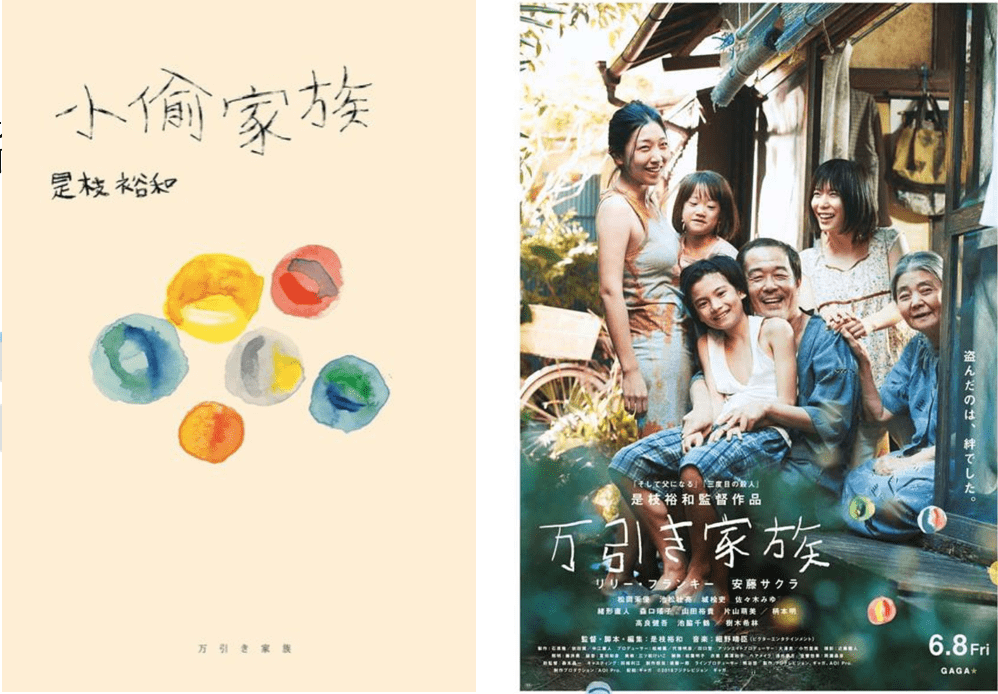
畢業於中正大學心理和哲學系,現就讀陽明交通大學社會與文化研究所。曾在關鍵評論網擔任書評專欄作者。文章主要投稿、刊登於 香港 微批paratext 或 虛詞.無形網站,多為文學、哲學類性質。另也有動漫評論發表於U-ACG。 信箱:f0921918962@gmail.com 信箱:f0921918962@gmail.com
About Shi-eda Hirokata "The Thief's Family": Between "family", a kind of sadness, a kind of relief

It's Hirokazu Kore-eda's 2018 work—"The Thief Family"—that's a ghost that's hard to linger on for me. Although this work continues the theme that the director usually touches, it explores the proposition between blood and family. But I have always felt that compared to the director's other works (for example: "My Accidental Dad", "Haijie Diary"), there is a more ambiguous element, emotion, flowing in this film, stirring something secretly . It has been almost two years now, and I finally understand what "The Thief Family" stole from my heart at that time.
The key is that I understand that what "The Thief Family" really makes me feel is not all a deep sadness, but a kind of relieved emotion in addition to the sadness.
"Families can only be connected by 'crime' - what they stole is family affection."
"Stealing" is the most ambiguous element of the entire film. Because the "stealing" that Hirokazu Kore-eda is talking about is not simple, he is not only referring to a crime that is simply done to survive, but more of a metaphor, alluding to people's desire and impulse for family affection.
The reason why the "family" in the film "steal" is because of poverty, I think. The most important thing is loneliness. This loneliness is related to the "abandonment" mentioned in the film: to some extent, although not completely abandoned, they all have a sense of being abandoned by their original family. Just like Rin and Shota, although they are not sure if their parents really intend to abandon them, when they are "picked up", they are indeed in a state that seems to be "abandoned".
Personally, it is this feeling of abandonment that makes Hirokazu Koreeda's film able to touch the hearts of many audiences and even have a huge resonance. And let's see after the movie, when people accuse Aji and Nobuyo of bringing the abandoned Rin and Shota back to their "family" as a crime of "kidnapping", they will feel resentment and pain.
I don't know if everyone feels this way. In the early part of the movie, when we saw Shinyo bring Shota and Rin to buy croquette on the street, Aji steals with Shota (later Shota steals with Rin), Hatsue We seem to have a feeling of envy when we sleep with Aki in the same bed every night. I feel like they are like a perfect and ideal family. Although they have done a lot of illegal things, they love each other deeply. When complaining about each other, they can care and rely on each other at the same time. As a result, it is difficult for us to believe that such a "family" is actually formed without any blood relationship with each other, and their past is full of acts that are generally difficult to face (killing, cheating money, instigating children to enter the porn industry, etc. ).
In Hirokazu-eda, stealing becomes an intimate interaction, a bond, not just a crime. We watch and even can't help but want to get involved in a "crime" like this, because in such a crime, "stealing" reflects a deep desire for "family."
As far as I can see, in fact, compared to poverty, the crime of stealing, it is the desire for family affection, coupled with the feeling of being socially isolated, that constantly promotes "criminal". We are like the "thieves" inside. Although we have not been abandoned, we have a sense of loneliness like being abandoned. We are like Aji and Nobuyo who picked up Rin inside, wanting to "steal" and "picked up". The bond of our desire. Sometimes in reverse, just like what couples in many movies say: "Oh ~ you/you stole my heart...", loneliness gives us a kind of willingness: wanting our hearts to be "stealed" by others , take away, to try to escape the family relationship that originally disappointed us, and then obtain a new, like redemption, "family" that may fill the gap in our hearts.
"Stealing" also conjures up a kind of jealousy, as if we are always envious of other people's families, so we want to "steal".
Why use the crime of stealing to discuss family relationships? I think this is the way Hirokazu Kore-eda adopted in order to touch on social issues; on the other hand, it uses the psychology of stealing to reflect the lack of "family" in modern people.
So, what is the sense of relief we mentioned at the beginning?
I think, compared to discussing the relationship between family and blood in the past (ie: the world is not only blood, which can give us fetters). In "The Thief Family", it is Hirokazu Koreeda who may really say this: There is no real ideal family in this world.
This may sound sad, but in retrospect, it's quite comforting. Because no matter how bad the family environment you grew up in, you don't need to feel inferior, and you don't need to be too envious of others. You don't have to be a relationship thief, and you don't have to feel lost because the person who "taken" your heart wasn't good enough. Moreover, no one in this world is truly abandoned.
Speaking of which, it seems that I finally understand why Nobuyoshi is finally willing to let go of their bonds with Rin and Shota.
It's all just encounters, and then we slowly become "family".
(The article is mainly published on the square grid blog platform: the laboratory of literature )
Like my work?
Don't forget to support or like, so I know you are with me..
Comment…